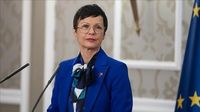Macedonia's path towards European Union membership continues to face uncertainty, as European Commissioner Marta Kos recently emphasized that constitutional changes alone will not guarantee the nation will avoid additional requirements from the EU. In an interview with the European News Agency (ENR) on April 16, 2025, Kos articulated the complex dynamics surrounding Macedonia's aspirations for accession, highlighting the ongoing negotiations with Bulgaria and the broader implications for the region.
"No one can guarantee that if Macedonia changes its constitution now, there won't be more obstacles on the European path," Kos stated, reflecting the cautious stance of EU officials regarding the Balkan nation's future. This statement underscores the precarious nature of Macedonia's negotiations and the potential for further conditions to be imposed by EU member states, particularly Bulgaria.
Kos acknowledged the challenges Macedonia faces, noting that the issue of constitutional amendments is a sensitive one. "We understand that this is not an easy matter. Changing the constitution is a significant step. We also understand, and it is very human and understandable, that your country wants guarantees after everything it has gone through," she explained. However, she reiterated that guarantees cannot be provided, urging all member states to engage in discussions with goodwill and a vision for compromise.
Furthermore, Kos confirmed remarks made by Bulgarian Foreign Minister Georg Georgiev, who pointed out that the inclusion of Bulgarians in Macedonia's constitution as a state-building nation is not the only condition for progress. Georgiev's comments highlight the intricate web of bilateral issues that complicate Macedonia's EU accession efforts. "This shows that if there is a potential goal – if constitutional changes happen and then other conditions from the European consensus arise – then someone might say, 'See, did we not tell you that Bulgarians have more than one thing in mind?'" Kos quoted.
Despite the challenges, Kos expressed hope for a resolution that could unblock Macedonia's accession process. She stated, "I hope a solution will soon be found to unblock the country's accession process, and as soon as that happens, negotiations can start without new conditions." This optimism, however, is tempered by the reality that bilateral disputes, such as those between Macedonia and Bulgaria, should not interfere with the accession process.
In her remarks, Kos also referenced the situation of Hungary, which is advocating for its minority rights in Ukraine, as a parallel to the complexities Macedonia faces. "I can understand that Hungary is fighting for its minority (in Ukraine). I can understand that Bulgaria is doing the same, but it is detrimental when these issues truly interfere with the accession process," she stated, emphasizing the need for a clear separation between internal minority rights issues and the broader EU integration efforts.
Moreover, Kos expressed her understanding of the frustrations felt by the Macedonian people regarding the prolonged accession process. "In the current circumstances, I completely understand the disappointment of the people in Macedonia," she remarked, acknowledging the emotional toll that the drawn-out negotiations have taken on the nation's citizens.
The European Commission, Kos affirmed, is actively working to assist Macedonia in starting negotiations. She noted her personal commitment to addressing the bilateral issues with Bulgaria and mentioned her upcoming meetings with Bulgarian politicians in Sofia. This proactive approach indicates the EU's recognition of the importance of resolving these disputes to facilitate Macedonia's progress.
As Macedonia navigates these complex waters, the stakes remain high. The potential for further conditions from Bulgaria looms large, and the outcome of ongoing negotiations will significantly shape the future of Macedonia's EU aspirations. The hope is that through goodwill and compromise, a path forward can be established that allows Macedonia to embark on its long-awaited journey towards EU membership.
In summary, the situation in Macedonia illustrates the intricate balance between national aspirations and regional dynamics. As the country seeks to align itself with EU standards, the importance of addressing bilateral issues with neighboring states cannot be overstated. The coming months will be critical as Macedonia attempts to navigate these challenges and work towards a brighter future within the European community.



